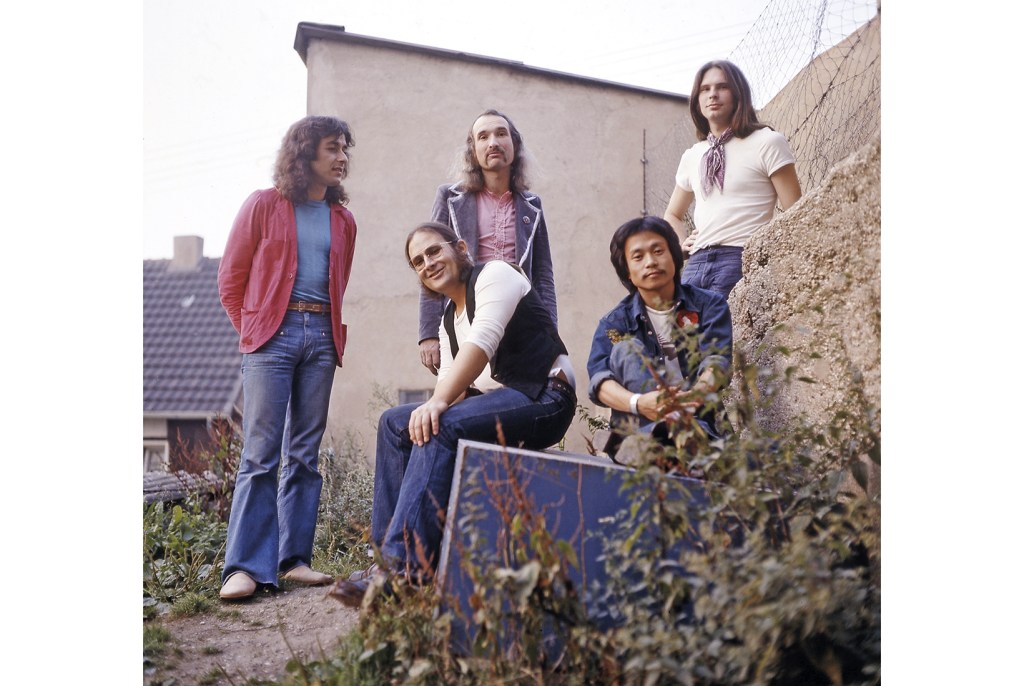‘The records are only half of the picture,’ says Irmin Schmidt, founder member of the great German experimental collective Can. ‘Live [performance] is the side of ours which actually has still to be discovered. For many of the people who came to our concerts, it was much more important in building up the legend than the records, because it was something extraordinary.’
Rock music is neck deep in retrospection these days, but the release of a ‘new’ Can album, Live in Stuttgart 1975, can’t be dismissed as just one more trawl through the floor sweepings. Instead, as Schmidt suggests, it reshapes what we know about one of the most influential bands of the 20th century.
Formed in Cologne in 1968 by Schmidt, who played keyboards, and bassist Holger Czukay, alongside drummer Jaki Liebezeit and guitarist Michael Karoli, Can used improvisation, repetition and trance dynamics to conjure music in which, in the words of their biographer Rob Young, ‘everything appears to be changing over an unchanging same’. They pioneered what became known — with minimum regard for cultural sensitivity, perhaps — as ‘Krautrock’. The Teutonic signifier is vital, says Schmidt, the band’s sole surviving original member, who at 84 remains sharp, salty and pleasingly immune to nostalgia.
The band was a reaction to a postwar German landscape in which, he says, ‘culture was deeply devastated. Our generation had to get everything from outside, because our parents’ generation still lived in this devastation’. This accounts for ‘a certain aggressiveness in our music. We had to rebuild culture, and not everybody accepted that. In the 1960s, pop and rock was only right when it came from outside [Germany], but we wanted to create something that related to our cultural environment, something which represented the time and space we were in, which was totally different from creating art in England.
‘In the beginning, the public in Germany did not accept what we were doing, because they thought we couldn’t play. For them, playing rock music was about imitating the Kinks or the Stones. We didn’t do that because we wanted to define this historical moment in Germany, and remind people that there is a German history and a tradition relating to the time before the Nazis.’
Schmidt and Czukay had studied under Stockhausen at the Rheinische Musikschule. Having spent his twenties working as a pianist, composer and conductor, Schmidt recalls being ‘corrupted’ on a trip to New York in 1966, where he engaged not only with avant-gardists like La Monte Young, Terry Riley and Steve Reich, but Andy Warhol’s Factory scene. He returned to Germany envisioning a band that merged the diverse currents of modern experimental music.
‘We didn’t even intend to become a rock group,’ says Schmidt. ‘I wanted a few musicians around me who came from totally different traditions of contemporary music. I came from the European classical music tradition, but there was another tradition that created jazz and rock, which basically has its roots in America and Africa. I wanted to bring these contemporary traditions together using people rooted deeply in other forms. Jaki started playing in a Dixieland band and ended up with free jazz. Michael was really a Beat guitarist. To bring together a melting of these traditions, you cannot plan it! You had to just spontaneously create something with those musicians. That is how the group was formed.’
Can was an open-ended exercise in dodging convention. Their first rehearsal space was a cluster of rooms in a 14th-century castle. They recorded live on to two-track machines, preferring the ability to play freely to studio polish. Their American vocalist Malcolm Mooney left the band in late 1969 after suffering a psychotic breakdown which, his psychiatrist suggested, may have been exacerbated by the chaotic nature of the music they were making. He was replaced by Damo Suzuki, a Japanese busker they spotted in Munich.
Perhaps unsurprisingly, there was never much in the way of commercial success. ‘From 1968 to 1972 we made very little money,’ says Schmidt. Things improved in 1972, when the loose, catchy ‘Spoon’ became a hit in Germany. In October 1976, ‘I Want More’ reached the lower reaches of the UK charts, prompting Can’s sole appearance on Top of the Pops, but ‘we never got rich, actually’.
The albums they made in the early 1970s — Tago Mago, Ege Bamyasi and Future Days — are extraordinary, yet Schmidt argues that they barely scratch the surface. The value of Live in Stuttgart 1975 lies in the wider focus it brings to the band’s improvisatory purpose. The five long tracks are simply titled ‘Eins’, ‘Zwei’, ‘Drei’, ‘Vier’ and ‘Fünf’.
‘We never got on stage and played rehearsed pieces that were on a record,’ says Schmidt. ‘Never ever. Mostly we invented totally from scratch. We also invented very spontaneously in the studio, but when something appeared we worked on it and edited it — it was totally different. On stage, we reacted to the public, to the ambience, and created from that.
‘To do this, of course, is a big risk. We did fail sometimes, we really made bad concerts. That’s the risk of going on stage and giving yourself totally to the moment. It might not click, between us or with the public. We always made two sets. The first set was an hour, then an intermission. Sometimes we were so [crappy], when we came back on stage we thought the hall would be empty, but no. They were all there, and often the second set went really good. That was the most amazing thing, and so fascinating. People really tried to help and take part even when it went wrong.’
Where were these tapes hiding all these years? ‘They weren’t hiding,’ says Schmidt, explaining that Can superfan Andrew Hall would often smuggle a cassette recorder and microphones inside a briefcase when he came to see the band. He ended up with an archive of 60 tapes. He also collected recordings from other fans, and made it all available. Schmidt regards this as a mixed blessing. His role as trustee, alongside his wife Hildegard, is not one he entirely relishes. Raking over the past, in the form of hundreds of hours of scratchy live tapes, wasn’t his idea of fun. ‘I didn’t want to go through them, it’s bloody work,’ he grumbles. ‘But no, Hildegard insisted. Since there were never any good live records of ours, finally I gave in. We have some more which we definitely will release. I don’t know how many, but some.’
Since Can split up in 1979, their sound and ethos can be heard in everything from ambient and electronic music to post-rock. The impact on artists such as the Fall, Brian Eno, Talk Talk, Primal Scream, Pavement and Radiohead is plain. ‘I think what makes people again and again discover new things in [Can] is that it is the depth of different influences, experiences and traditions,’ says Schmidt.
Is he proud of the legacy? ‘Pride is not the right word. Everything we did up to Soon Over Babaluma [in 1974] is OK. From then on, there are still wonderful things, but there are good pieces and less good, whereas the earlier records were works of art as a whole, especially Tago Mago. But look, I don’t listen to it! Only if I’m forced to. I’m not very given to sentimental, nostalgic feelings. If I hear a bad tape…I feel ashamed. You have to make your peace with it. But if something succeeded, it is distant. I listen to Can and it’s like it’s from somebody else.’
Live in Stuttgart 1975 is out now on Mute. This article was originally published in The Spectator’s UK magazine. Subscribe to the World edition here.


















